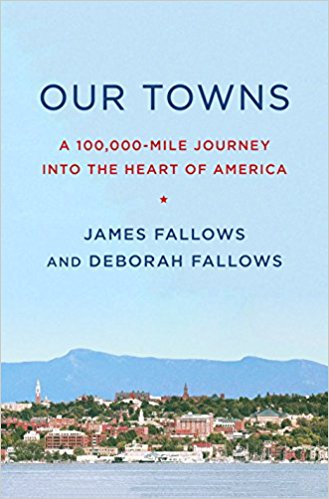You have /5 articles left.
Sign up for a free account or log in.
 Our Towns: A 100,000-Mile Journey into the Heart of America by James Fallows and Deborah Fallows
Our Towns: A 100,000-Mile Journey into the Heart of America by James Fallows and Deborah Fallows
Published in May of 2018.
There are many ways to read Our Towns.
As a travel book, written in the spirit of Steinbeck’s classic 1960 Travels with Charley.
As a love letter to the Cirrus SR22 small propeller-driven aircraft, and the joys of private aviation.
As an argument that the politics of small cities are less divisive than the national political debate would suggest.
And as an antidote to the media's fixation with creative class superstar urban areas, and the concomitant invisibility of smaller and less flashy small cities.
I choose to read Our Towns as a defense of public investment in postsecondary education. Indeed, it is the presence of both a research university and a strong community college system that seems to best predict small city economic dynamism.
Research universities are particularly adept at creating local human, economic, and social capital. They not only bring in large numbers of students, faculty, and staff to a given area - they also create wealth by spinning off new companies.
Community colleges, in contrast, act as a counterweight to trends that are driving ever greater levels of inequality. Today’s labor market and housing trends tend to concentrate wealth and privilege. Community colleges provide access to postsecondary education and credentials to those across the economic spectrum.
It was inspiring to read about progress towards downtown renewal and economic revitalization in cities such as Allentown PA, Burlington VT, Charleston WV, Pittsburgh PA, Duluth MN, Columbus OH, and Fresno CA. (Among many others). All of these cities seem to share both a critical mass of college students, and a growing number of brew pubs and organic coffee shops and locally run bookstores.
A persistent theme in Our Towns is the effectiveness of small city mayors in developing public-private partnerships for redevelopment efforts. Collaborative government and private sector development projects are championed by both liberal and conservative elected officials and local entrepreneurs.
Our Towns makes for an enjoyable and informative read for anyone interested local economics. As a writing team, the Fallows are particularly effective in highlighting different aspects of the cities in which their small plane lands.
Deborah Fallows, a linguist and academic, has a wonderful ear for local dialects and customs. James Fallows, a celebrated journalist (and at one time youngest chief presidential speechwriter ever under Carter), is most interested in the local startup and technology scenes.
Rather than combine their voices into a single narrative, Deborah and James alternate chapters and perspectives. This writing method is particularly effective in the audiobook version, with each Fallows narrating their own sections of the book.
If I have any complaints about Our Towns, it would be the choice to go wide rather than deep. It is great to get to know so many small cities that I hadn’t previously known anything about. However, the book would have been better if the authors had taken the time to do some deep dives.
I found the descriptions of Charleston WV, my wife’s hometown, to be particularly shallow. It was great to hear of a Charleston turnaround, but Our Towns spent almost no time describing the changes in employment or industry or social life that Charleston is experiencing. Rather, almost the entire chapter is spent with Larry Groce, a Charleston resident and host of the NPR radio show Mountain Stage. (Which I love). Groce is an engaging character, but his West Virginia boosterism is not evidence of a small city turnaround.
I was also surprised that the Charleston WV chapter did not talk about the fact that the West Virginia University (where I started my academic teaching career) is located in Morgantown, and the challenges that not having the big public research university in the capital bring to the city and the state. I would have liked to have heard more about the challenges that Charleston, as well as the rest of the cities that the Fallows visited, continue to face. The bad news, as well as the good news.
Our Towns is so relentlessly upbeat about the prospects of small city America that one wonders about counter-examples, the places that are declining as well as those that are flourishing.
Fans of James Fallows’ writing (and I am one) will forgive these shortcomings. Our Towns is an important book. One that challenges all sorts of conventional wisdoms. The conventional wisdom that ambitious professionals can only thrive in expensive superstar cities. The conventional wisdom that American politics are broken. And the conventional wisdom that amenities such as colleges, brew pubs, coffee shops, bike paths, and local bookstores can only be found in a few big and expensive urban areas.
Do you live in a small city that deserves as much attention as Boston or San Francisco?
Is your research university and local community college the linchpin of local economic vitality?
Do you live in a small city that the Fallows should plan to fly to next?
What are you reading?




